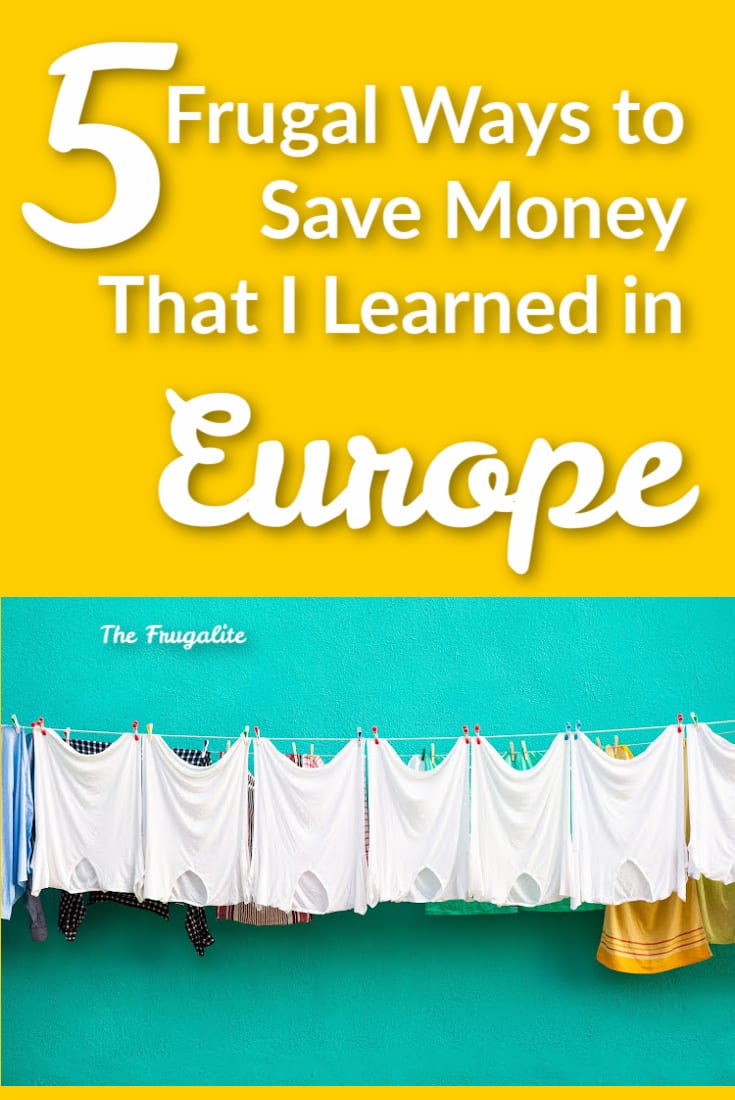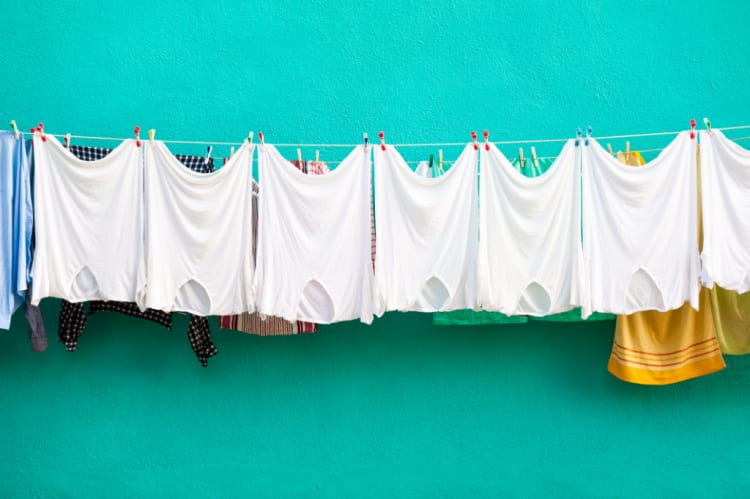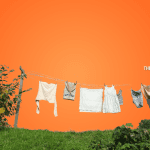(Psst: The FTC wants me to remind you that this website contains affiliate links. That means if you make a purchase from a link you click on, I might receive a small commission. This does not increase the price you’ll pay for that item nor does it decrease the awesomeness of the item. ~ Daisy)
This month marks the one year anniversary of when I sold basically all of my stuff and took off to Europe with a one-way ticket. (I wrote in detail how I afford a life of full-time travel in this article.) The interesting thing is, every place I’ve lived, I’ve learned some frugal tricks that are commonplace in those areas.
Keep in mind that many parts of Europe live with a lot less disposable income than we have in the United States. So they have a lot of interesting ways to save money, some of which you may wish to adapt to cut your own expenses. Here are five ways that Europeans save money. (Obviously, these tips are from the Europeans I met, and may not be representative of all Europeans.)
Don’t have a dryer.
One of the requirements at the Airbnbs I booked was that they had to have a washing machine. No way did I want to lug my dirty clothes around a strange city in search of a laundromat, then try to figure out how to use the machine with instructions that were in a language I could not yet read.
Well, finding a place with washers was easy. Finding a place with dryers? Nearly impossible. That’s because hardly anyone in Europe – at least the countries where I visited – uses dryers.
Most of the apartments I rented came equipped with a folding drying rack to put up for drying your clothes, while others had laundry lines. In fact, if you walk around residential areas in many European cities, clothing drying on lines like banners above the streets is ubiquitous. You can save a fortune on your electric bill by not using a dryer, as well as saving on the cost of the dryer itself.
Only use your hot water heater when you need hot water.
One thing that took a little getting used to was the fact that in many of the places I stayed, you only had hot water when you turned on the water heater. There was generally one that served both the kitchen and the bathroom, but I stayed in a few locales that had a separate heater for each room.
These aren’t massive hot water heaters like the ones we use in the United States, but smaller ones. They take 15-30 minutes to fully heat up, so you have to plan ahead when you want to do your dishes or have a shower. After you’ve used your hot water, you flip off the switch. You’ll have a small amount of hot-to-warm water for the next few hours (sometimes up to 12) for quick handwashing. Once that runs out or cools off, the running water you use will be cold.
It sounds terribly inconvenient and it was, initially. But I got better at planning when I was going to have a shower, if I didn’t have hot water for dishes, I quickly boiled a pot of water to pour into the kitchen sink, and I adapted.
Go out for lunch or coffee instead of dinner.
Meeting up at restaurants is a huge part of the culture in many of the cities I visited. But having dinner is pretty expensive. I found that during the day, sidewalk cafes were absolutely jam-packed with people enjoying coffee together – you couldn’t find a table anywhere. Lunchtime was also busy (when prices are lower.)
Remember, frugality doesn’t mean you have to give up on everything fun. It means you have to prioritize and budget for the things that mean a lot to you. And if that means meeting up at cafes with your friends, then suggest having coffee instead of a full meal.
Use your dried bread.
I’d never heard of “rusks” before going to Europe. (Perhaps you have and I’m just sheltered.) Rusks are pieces of twice-baked bread that you can make once your bread becomes stale.
In Greece, rusks were often placed at the bottom of a dish and topped with soup or another hot food, which softened it up. They’re also placed at the bottom of a bowl of salad where they soak up the salad dressing. While I wasn’t really a fan, lots of folks really love it and find it a tasty way to end their meal.
You could easily take your cute from Europeans and twice-bake your stale bread after cutting it into sticks or cube form and use it like crackers or croutons. Not only does this make use of your stale bread that most people would throw out, it also spares you from needing to purchase croutons or crackers.
Walk everywhere.
When I lived in Europe, I didn’t have a vehicle. In larger cities like Athens, I used Uber sometimes to get around, but for the most part, it was me and my own two feet. The entire time I was in Montenegro, I rode in a car only one time other than entering and leaving the country.
This helped me in many ways. First, it got me out there every single day, rain or shine. When you live in a tiny apartment, even when you stock up on some food items, you still find yourself hitting the markets on a regular basis. I shopped for food daily throughout most of my stay – it’s nice to pick up your baguette, meat, and vegetables when they’re at their peak freshness.
The other great thing about it is fitness. When I first arrived in Europe I was hyperventilating up the hill to my beautiful Athens apartment. By the time I left many months later, I was carrying a 30-pound backpack full of food, bottled water, and wine up 435 stairs to my apartment in Montenegro. Yes, you read that right – 435 stairs and I was no longer huffing and puffing.
Walking saved me a fortune: no car payment, no car insurance, no repairs, no parking costs. And best of all, it made me a whole lot healthier without a pricey gym membership.
Do you have any thrifty habits you learned from another country?
I’m currently in Mexico and will have another article along these lines of frugal ideas from this part of the world if you guys are interested. Have you picked up any thrifty tips while traveling or living in a different country? Please share your ideas in the comments.












14 thoughts on “5 Frugal Ways to Save Money That I Learned in Europe”
I found this article interesting and would love to hear about Mexico.
I worked with some Chinese exchange students a few years ago, and the big culture shock thing for them was using a washer and dryer. They were used to doing their laundry by hand in a tub or bucket of water and hanging it to dry. I’ve been doing mine in 5gal. buckets or the tub and drip drying for about a year now. I figure I’ve saved a minimum of $250 – $300.
We change clothes as soon as we arrive home. We have old work clothes or jammies and save our nice clothes for days out. You don’t need to wash them as often, (so they last longer) especially since we are not wearing them for sweaty/dirty work. Also jammies are cheaper to replace.
There are articles talking about how you should NOT wash your jean often, apparently you can put them in the freezer to clean them too – can’t remember what that does – hardens the dirt and you shake them out?
Changing your clothes once you’re home, after work or whatever, is how I was raised in the Deep South. It still makes sense: you won’t have to buy the usually-more-expensive work or ‘nice’ clothes as often IF you take good care of them.
Here dryers aren’t a common everyday use and loads of people don’t have them. All clothes go on the line outside in fresh air (love that clean smell) I have one but rarely use it except in emergency if I’m sick or if the cloth nappies aren’t drying inside . We mostly walk to our local shops for a few things for a bigger shop I’ll take the car. Just seems a pain to take the car and the car parking is small as most walk to our local. I have noticed since covid19 alot of people have gone back to using the smaller shops so the bakery, fruit shop and butchers are doing booming business. I’d love to hear about Mexico I’ve always wanted to go but have never made it.
In many foreign countries the problems with lone or teams of pickpocketers are well understood. Foreigners quickly learn to dress looking as much like the locals as possible. Avoid displaying expensive anything whether jewelry, high end clothes handbags, etc. There are also lots of clothes (pants, shirts, jackets, vests, etc) designed specially for travelers with many hidden compartments to discourage such theft.The equivalent in the US are the never ending police departments, TSA, Border Patrol, etc who all behave as if the 4th Amendment protections are a dead letter … and often confiscate large amounts of cash that you are unwise enough be carrying or transporting. They frequently use weasel theories like civil asset forfeiture (police), or unreported large cash amounts (TSA or Border Patrol) to steal your cash, until or if you can fund an expensive lawsuit that may or may not return your cash — less legal expenses. The best practice if you’ve just sold your house or sold a business or some other major asset is to wire transfer those funds to a safe destination — instead of carrying them in the form of seizeable cash. Preventing a major loss is just as important as squeezing nickels.
Protecting your data from loss is also not trivial. There are too many stories lately of someone returning from some country with which the US has a conflict of politics … and having Customs seize a returnee’s laptop to extract the data and then sit on that laptop for many months. It would have made much more sense to have uploaded anything sensitive to “cloud storage” (from which you could later retrieve it) and then wiped it from that laptop — to make it a much less inviting target to pilfer. This would especially be the case with data that you might have encrypted with something like Phil Zimmerman’s PGP — which the government despises. Phil even had to move to Switzerland lately because of that ongoing war. Such encrypted data on your laptop would be a blatant invitation for Customs to hold your laptop for the ransom of decrypting any coded information on it — for their nosy satisfaction — before you could get that laptop back. Avoiding the costs of such a fight is also most worthwhile.
–Lewis
Living in the Pacific Northwest, rain is common for several months from fall through spring. Most of us find a dryer necessary. However, except for sheets and towels, I like to spin my clothes in the dryer for a very short time, just to warm them up a little and fluff them to get some wrinkles out. Then I put the clothes on hangers and hang them outside on a clothesline in summer, or a rod in the laundry room during the rainy season. This cuts way down on dryer time and keeps a lot of clothes wrinkle-free.
Lucy, Try it the other way around. Dry all of your clothes hanging up, then pick out the clothes you don’t want wrinkles in and throw them in the dryer 10-15 minutes. When you take them out to hang them up they will be the same as if you had dried them in the dryer. I do all of my clothes this way. Less wear and tear, and no shrinking.
Well, being from Southern California, we didn’t know how to deal with cold nights in Utah when we visited my wife’s grandmother. She would turn off the heater at night in the winter – and expect us to use multiple blankets. Then she’d turn on the heater for a while in the morning hours. As opposed to having an automatic heater on all night to maintain a certain temperature.
Decades ago, I lived in a camper and got RV magazines. They had ads for a water heater than turned on when you opened the hot water tap and directly heated the water going thru the pipe, “last shower as hot as the first.” I have yearned for that in apartments and houses to save money and time.
I hope somebody can locate such a company and we can promote it nationwide. And worldwide.
It’s called a tankless water heater. We have had one since 2006. In the UK it is called a batch water heater.
They are available now. They are called tankless hot water heaters. Usually run on propane or natural gas. The things I have read say that electric ones take to long to heat.
I used to hang our laundry outside year round then when frozen in winter brought it inside to dry by the stove. They still smelled fresh like snow almost. Now we’ve been invaded by nasty evil stink bugs ( thank you china….not) and you can’t shake them off your clothes at all, then they’re in your house making a stink and crawling on everything including you. ugh! So now I have to use the drier but I hang my blouses to dry by the sliding glass door opened in warmer weather. The bugs can’t get to the clothes ha!. We used to go out for breakfast since its the cheapest meal at restaurants but since the “lockdown” we don’t bother anymore. Don’t even miss it. I use old bread to make garlic bread for our meals. Works great. If I wasn’t so rural here in the mountains I’d be walking places all the time also.